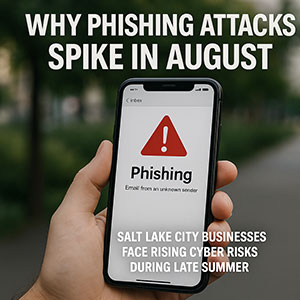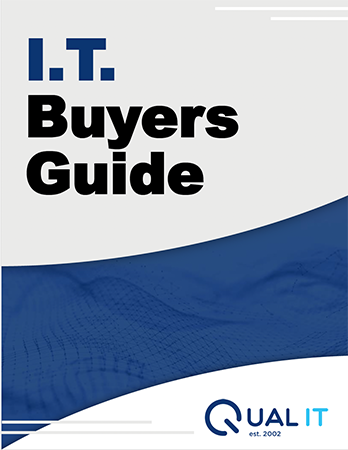 Healthcare clinics and private practices face elevated cybersecurity threats every summer
Healthcare clinics and private practices face elevated cybersecurity threats every summer
Your front office may be easing back into routine after summer PTOs. Your clinical team might be catching up on charting or preparing for the fall rush. But there’s one group that never takes a vacation—cybercriminals.
Phishing attacks consistently spike in late summer, and 2025 is no different. According to new data from security researchers like Check Point and ProofPoint, phishing scams targeting small businesses have increased dramatically—especially in industries like healthcare where access to patient data makes practices more lucrative targets.
And the worst part? These attacks often start with one simple email.
If you’re running a medical practice in Salt Lake City and relying on generic IT support or hoping your staff won’t click anything suspicious, August is when the cracks start to show.
What’s Causing the Surge?
Cybercriminals are adapting to our habits. As more Salt Lake City physicians, nurses, and admin staff travel in the summer months, attackers are spinning up fake booking confirmations, hotel websites, and Airbnb lookalikes. In May 2025 alone, there was a 55% increase in vacation-related domains—many of which were flagged as malicious.
And then there’s back-to-school season. Even if your practice doesn’t serve pediatric patients or education groups, your staff likely includes parents or students. Hackers capitalize on this too—disguising malware as emails from universities or tuition services.
One moment of distraction—clicking a personal email on a clinic workstation—is all it takes to put your entire network at risk.
What Medical Practices in Salt Lake City Can Do About It
Let’s be honest: modern phishing emails don’t look like they used to. Many are written using AI and come off as polished, professional, and completely believable.
That’s why at Qual IT, we don’t just offer cybersecurity tools—we provide staff training that helps teams recognize threats before they click. If your practice depends on EMR systems, revenue cycle software, or even secure messaging platforms, this isn’t optional anymore.
Here’s how to reduce your risk:
- Review every sender and link. AI-generated emails may not have typos or red flags. Always double-check the “from” address and hover over links before clicking.
- Avoid link-clicking altogether. Teach staff to navigate directly to known websites, rather than following embedded links in messages or texts.
- Watch for URL trickery. Domains ending in .info, .today, or slightly misspelled names (like “epicsystems.health” instead of the real thing) are major red flags.
- Implement Multifactor Authentication (MFA). Especially for logins to your EMR, eFax, billing portals, or patient communication systems.
- Use a secure VPN when working remotely. Traveling team members should never log in from public WiFi without a secured connection.
- Keep personal and work email separate. Staff should be reminded not to check Gmail or Yahoo accounts from clinic devices.
- Use endpoint detection. EDR tools can spot phishing activity in real-time and alert our team before the damage spreads.
Salt Lake City’s Healthcare Cyber Landscape Is Changing—Fast
You’re not just running a business—you’re running a practice that’s responsible for patient data, HIPAA compliance, and clinical uptime. One successful phishing attack could lock you out of your EMR, trigger a data breach investigation, or worse, compromise protected health information.
That’s why more practices in Salt Lake City are partnering with managed IT providers that understand healthcare from the inside out.
At Qual IT, we specialize in supporting medical practices like yours—with HIPAA-compliant cybersecurity, EMR expertise, and 24/7 support when things go sideways.
Let’s Keep Your Practice Safe This Summer
Don’t let one fake email undo everything you’ve worked for.
If you’re unsure whether your current protections can handle a modern phishing attack, now is the time to get ahead of it.
Click below to book your free network assessment. We’ll walk through your current system, flag vulnerabilities, and help you build a plan that keeps your practice protected—no scare tactics, no jargon, just straight answers from a team that knows healthcare IT.



